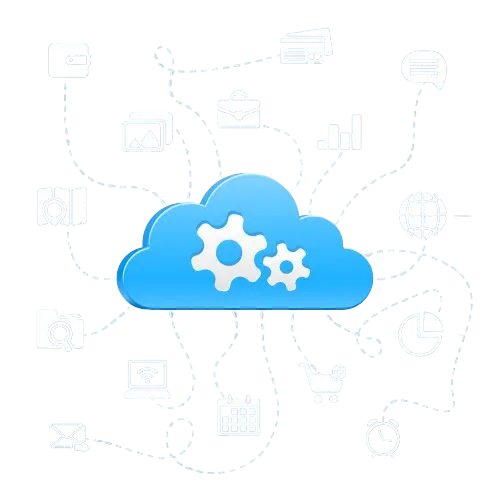Benefits of Salesforce Commerce Cloud for Your Business
- Increase Revenue with Intelligent Recommendations
- Provide a Powerful Mobile Experience
- Improve Shipping and Payment Methods
- Deliver Personalized Experiences Through Connected Customer Journeys
- Offer Flexible, Omnichannel Order Management Anywhere in the World

Trusted by the Top Brands





Our Salesforce Commerce Cloud Implementation Services
Our Salesforce Commerce Cloud consulting services embrace customer service, community, and marketing to create unified commerce. We support the entire customer success journey, enabling brands to successfully connect with shoppers.
Our developers and solution architects implement and launch your brand on Salesforce Commerce Cloud. We design scalable, personalized experiences for shoppers, driving customer satisfaction and revenue with a strategy built on proven technology and leveraging our decades of experience as SFCC partners.
Client Achievements
- Revenue Increased by Up to 60% compared to the previous quarter after implementing our solutions.
- Management and Tracking Efforts Reduced by 65%, streamlining operations.
- Daily Visitors Increased by Nearly 50%, enhancing brand visibility.
- Optimized Order Management Solutions automate inventory management, order fulfillment, and payments, addressing challenges with returns and refunds to make customers feel more comfortable buying online.

Key Features of Salesforce Commerce Cloud

Order Management

Commerce Portals

Omnichannel Capabilities

Mobile-Friendly Design
Frequently Asked Questions
1. What is Salesforce Commerce Cloud and what are its core functionalities?
Salesforce Commerce Cloud is a comprehensive digital commerce platform designed to power exceptional shopping experiences across all channels. This cloud-based solution enables businesses to create unified, personalized customer journeys throughout the entire shopping experience.
Core functionalities of Salesforce Commerce Cloud include:
- Unified commerce platform that bridges online and offline shopping experiences
- AI-powered personalization through Einstein AI to deliver relevant product recommendations
- Omnichannel capabilities allowing seamless transitions between web, mobile, social, and physical stores
- Merchandising tools for catalog management, promotions, and pricing strategies
- Order management systems that orchestrate fulfillment across channels
- Global expansion features supporting multiple languages, currencies, and payment methods
- Developer-friendly architecture with API-first approach enabling customization
At Etelligens, we've observed that businesses leveraging these core functionalities typically experience significant improvements in conversion rates and customer satisfaction scores. The platform's ability to unify commerce data provides actionable insights that drive strategic decision-making.
According to Salesforce's own research, Commerce Cloud users have reported an average of 26% increase in conversion rates and 41% growth in revenue after implementation. These results demonstrate why leading brands across retail, manufacturing, and consumer goods industries continue to adopt this solution.
2. What is the concept of a commerce cloud and how does it apply to the ecommerce industry?
A commerce cloud represents the evolution of ecommerce platforms from on-premise systems to cloud-based solutions that provide scalability, flexibility, and integrated capabilities. At its core, the concept encompasses a suite of connected digital services delivered via cloud infrastructure to power modern commerce operations.
In the ecommerce industry, commerce cloud solutions apply through several transformative approaches:
- Unified commerce operations that connect inventory, ordering, and customer data
- Elastic scalability to handle seasonal demand spikes without infrastructure investments
- Continuous innovation through regular platform updates without disruptive upgrades
- Reduced total cost of ownership by eliminating hardware maintenance
- Enhanced security posture with enterprise-grade protection of customer data
- Data-driven decision making through integrated analytics and reporting
When implemented effectively, as we've seen with clients at Etelligens, a commerce cloud creates a foundation for growth that traditional platforms struggle to match. The shift represents more than technological advancement—it's a fundamental change in how businesses approach digital commerce strategy.
The commerce cloud concept has matured significantly, with platforms like Salesforce Commerce Cloud leading adoption across industries. According to Forrester Research, businesses using cloud commerce platforms report 30% faster time-to-market for new features and 25% higher team productivity compared to legacy systems.
3. What are the key benefits of implementing Salesforce Commerce Cloud for ecommerce businesses?
Implementing Salesforce Commerce Cloud offers ecommerce businesses a range of strategic advantages that extend beyond typical platform capabilities. Organizations that make this investment typically realize benefits in multiple dimensions of their operations.
Key benefits include:
- Accelerated time-to-market for new storefronts, promotions, and features through pre-built components
- Enhanced customer experiences through Einstein AI-powered personalization and recommendations
- Seamless omnichannel capabilities connecting web, mobile, social, and physical retail experiences
- Business agility through a microservices architecture supporting rapid iteration
- Operational efficiency with automated merchandising, promotion, and inventory tools
- Global expansion readiness with multi-language, multi-currency, and localization features
- Future-proof architecture that evolves with regular platform updates
From our experience at Etelligens implementing Commerce Cloud for various clients, we've observed that companies typically see ROI through increased conversion rates, higher average order values, and improved customer retention metrics.
A 2023 study by IDC found that Salesforce Commerce Cloud customers achieved 377% ROI over three years, with payback in less than six months. These results align with what many digital commerce leaders report—the platform's comprehensive capabilities create sustainable competitive advantages in increasingly crowded markets.
4. What are the benefits of using cloud-based solutions for ecommerce businesses?
Cloud-based solutions have fundamentally transformed how ecommerce businesses operate, providing advantages that traditional on-premise systems simply cannot match. These benefits create both immediate operational improvements and long-term strategic value.
Primary benefits include:
- Reduced infrastructure costs by eliminating hardware purchases and maintenance
- Elastic scalability to handle seasonal peaks without performance degradation
- Faster innovation cycles through continuous platform updates and new features
- Enhanced security posture with enterprise-grade protection and compliance
- Global accessibility for distributed teams and multiple store operations
- Simplified integration with other cloud services and third-party solutions
- Predictable operating expenses through subscription-based pricing models
At Etelligens, we've guided numerous businesses through transitions to cloud commerce platforms, consistently observing improvements in development velocity and operational efficiency. The ability to deploy new features incrementally rather than through major releases accelerates time-to-value.
Research from Gartner indicates that organizations leveraging cloud commerce solutions experience 40% faster deployment times and reduce total cost of ownership by up to 30% compared to on-premise alternatives. The flexibility to scale resources according to demand patterns provides both performance benefits and cost efficiencies that create sustainable advantages.
5. How does Salesforce Commerce Cloud help with product and order management?
Salesforce Commerce Cloud transforms product and order management through unified systems that streamline operations across the entire commerce lifecycle. The platform provides robust capabilities that centralize these critical functions.
For product management, Commerce Cloud delivers:
- Centralized catalog management supporting complex product hierarchies and variants
- Digital asset management for product imagery and rich media content
- Attribute management for detailed product specifications and filtering options
- Pricing and promotion engines supporting sophisticated rules and personalization
- Content scheduling for seasonal updates and time-sensitive product launches
On the order management side, the platform provides:
- Unified order processing across all shopping channels
- Intelligent order routing to optimize fulfillment based on inventory and proximity
- Distributed order management capabilities for ship-from-store and pick-up options
- Order modification workflows for changes, cancellations, and returns
- Real-time inventory visibility across all fulfillment locations
At Etelligens, we've implemented these capabilities for retailers who previously struggled with disconnected systems. The resulting operational efficiency gains typically manifest as reduced order processing costs, improved inventory accuracy, and enhanced customer satisfaction.
According to Salesforce's benchmark data, businesses using Commerce Cloud's integrated order management capabilities see 24% higher inventory turn rates and 18% reduction in fulfillment costs. These improvements directly impact both customer experience and bottom-line performance.
6. How does a commerce cloud facilitate omnichannel experiences?
A commerce cloud facilitates omnichannel experiences by creating a unified foundation for customer interactions across every touchpoint. This architectural approach eliminates the channel silos that fragment customer journeys and create inconsistent experiences.
Key enablers of true omnichannel delivery include:
- Single view of customer data that follows shoppers across channels
- Unified commerce platform connecting online and offline experiences
- Consistent product information synchronized across all touchpoints
- Real-time inventory visibility across all fulfillment locations
- Channel-agnostic promotions that apply regardless of purchase path
- Unified order history accessible to both customers and service agents
- Seamless cross-channel journeys like buy online, pickup in-store (BOPIS)
Through our implementation work at Etelligens, we've seen how commerce cloud solutions transform disjointed multi-channel approaches into cohesive omnichannel experiences. This shift fundamentally changes how customers perceive and interact with brands.
Research from Harvard Business Review confirms the business impact, finding that omnichannel customers spend 4% more on shopping occasion in-store and 10% more online than single-channel customers. Additionally, these customers demonstrate 30% higher lifetime value. Commerce cloud platforms make these benefits accessible through their integrated architecture and unified data models.
7. What are the features of Salesforce Commerce Cloud that aid in merchandising and personalization?
Salesforce Commerce Cloud offers a sophisticated suite of merchandising and personalization features that enable retailers to deliver tailored shopping experiences at scale. These capabilities leverage both rules-based approaches and AI-powered intelligence.
Key merchandising features include:
- Visual merchandising tools for intuitive category and search results management
- Automated sorting rules based on performance metrics like conversion or margin
- Advanced promotion engine supporting complex discount structures and stacking rules
- Scheduled merchandising changes for seasonal and campaign-based updates
- A/B testing capabilities to optimize product presentation and navigation
For personalization, Commerce Cloud provides:
- Einstein Product Recommendations using AI to suggest relevant products
- Einstein Search Dictionaries improving search relevance through AI-enhanced understanding
- Personalized content delivery based on shopper attributes and behaviors
- Customer segment targeting for differentiated experiences
- Real-time personalization adapting to in-session behaviors
At Etelligens, we've implemented these features for retailers seeking to move beyond one-size-fits-all experiences. The resulting personalization typically drives measurable improvements in key metrics like conversion rate, average order value, and repeat purchase frequency.
According to McKinsey research, companies that excel at personalization generate 40% more revenue from those activities than average players. Salesforce Commerce Cloud's merchandising and personalization capabilities provide the technical foundation to achieve this level of personalization at scale.
8. What are real-world examples of commerce cloud implementations?
Real-world commerce cloud implementations demonstrate how the platform's capabilities translate into tangible business outcomes across diverse industries and business models. These examples illustrate both the versatility and impact of commerce cloud solutions.
Notable implementations include:
- Retail Transformation: A specialty apparel retailer implemented Salesforce Commerce Cloud to unify their previously fragmented digital and in-store experiences. After launching their integrated platform with Etelligens' implementation support, they reported 37% higher mobile conversion rates and a 42% increase in digital revenue within the first year.
- B2B Evolution: An industrial supply company transformed their legacy ordering system to Commerce Cloud, creating personalized catalogs and pricing for different account types. The implementation reduced order processing costs by 28% while increasing average order value by 15% through improved cross-sell recommendations.
- Global Expansion: A beauty brand leveraged Commerce Cloud to expand from 3 to 12 international markets in 18 months, using the platform's multi-site, multi-language, and localization capabilities. This expansion generated 45% year-over-year international revenue growth with minimal increase in operational overhead.
- Direct-to-Consumer Launch: A traditional wholesale manufacturer launched their first D2C channel on Commerce Cloud, creating a new revenue stream without disrupting existing distribution relationships. The platform enabled rapid market entry with sophisticated product presentation capabilities that showcased their premium positioning.
Research from Forrester indicates that commerce cloud platforms typically deliver 3-5 percentage points higher gross margins compared to legacy systems through operational efficiencies and enhanced conversion rates. These case studies validate the business case for modern commerce cloud investments.
9. How does Salesforce Commerce Cloud integrate with other Salesforce clouds?
Salesforce Commerce Cloud integrates seamlessly with other clouds in the Salesforce ecosystem, creating a unified customer platform that extends well beyond traditional commerce capabilities. These integrations enable cohesive customer experiences and operational efficiencies.
Key integration points include:
- Salesforce Service Cloud: Provides service agents with complete customer purchase history, enables order modification workflows, and connects post-purchase service interactions to the commerce experience
- Salesforce Marketing Cloud: Powers personalized marketing journeys based on commerce behaviors, triggers targeted campaigns after cart abandonment, and synchronizes product data for consistent marketing content
- Salesforce Experience Cloud: Creates branded self-service portals for order management, account services, and community engagement
- Salesforce Customer 360: Unifies customer profiles across commerce, service, and marketing touchpoints to enable truly personalized experiences
- Salesforce Analytics: Delivers comprehensive commerce analytics and dashboards for data-driven decision making
Through our implementation work at Etelligens, we've observed that organizations maximizing these integrations achieve substantially higher returns on their Salesforce investments. The unified platform approach eliminates data silos that typically fragment customer experiences.
According to Salesforce's own research, companies using three or more Salesforce clouds report 34% higher customer satisfaction and 38% faster resolution times compared to those using standalone cloud implementations. This integrated cloud architecture represents a key strategic advantage of the Salesforce ecosystem.
10. How does commerce cloud improve digital commerce operations?
Commerce cloud solutions significantly improve digital commerce operations through a combination of process automation, unified data models, and cloud-based architecture advantages. These improvements create operational efficiencies while enhancing customer-facing capabilities.
Key operational improvements include:
- Streamlined merchandising workflows through intuitive interfaces and bulk operations
- Automated catalog management with scheduled updates and inheritance rules
- Simplified promotion management with reusable templates and preview capabilities
- Reduced technical overhead through cloud infrastructure and managed services
- Accelerated innovation cycles with regular platform updates and new features
- Enhanced developer productivity through modern development tools and frameworks
- Unified reporting across all commerce operations and channels
In our work at Etelligens implementing commerce cloud solutions, we've consistently observed operational efficiency gains that free commerce teams to focus on strategic initiatives rather than system maintenance and basic operations.
Research from Nucleus Research indicates that commerce cloud implementations typically reduce IT administration costs by 40% compared to on-premise solutions while simultaneously improving system reliability. The combination of operational improvements and reduced overhead creates a compelling business case for commerce cloud adoption.
